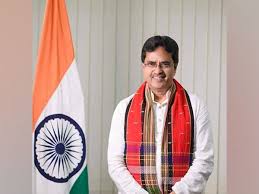‘Such incidents should not happen’: Tripura CM Manik Saha on Pradyot Kishore being denied audience with Gomati DM

Tripura Chief Minister Manik Saha has ordered a probe after Pradyot Kishore Debbarma, founder of TIPRA Motha, was denied an audience with Gomati District Magistrate (DM) Tarit Kanti Chakma. This incident has sparked political controversy and questions about administrative behavior in the state.
The Incident
On May 25, 2025, Pradyot Kishore Debbarma visited the Gomati DM’s residence in Udaipur. He was accompanied by Purna Chandra Jamatia, Chief Executive Member of the Tripura Tribal Areas Autonomous District Council (TTAADC). They aimed to discuss urgent issues affecting a remote tribal village.
Despite attempts over the past month to reach the DM by phone, the calls went unanswered. When they arrived at the residence, security personnel refused to let them meet the DM. The staff said the DM would only meet visitors with prior appointments.
TIPRA Motha’s supporters viewed this refusal as a disrespectful act. Youth groups protested, demanding action against the DM and calling for his transfer. They warned of strikes in government offices across Gomati district if their demands were ignored.
Political Reactions
The incident drew sharp criticism from opposition leaders. CPI(M) leader Jitendra Chaudhury called the DM’s behavior “authoritarian” and likened it to “colonial-era bureaucracy.” Congress MLA Sudip Roy Barman also condemned the refusal, saying it showed administrative overreach.
Pradyot Kishore expressed his disappointment and urged the government to respect tribal leaders. He stressed the need for open communication between elected representatives and officials. Such dialogue, he said, is vital for tribal welfare.
Chief Minister’s Response
Chief Minister Manik Saha responded quickly to the issue. He instructed Chief Secretary J.K. Sinha to conduct an inquiry into the matter. Saha said, “Such incidents should not happen in a democracy. Dialogue between administration and elected leaders is essential.”
He added that the incident might have resulted from a communication gap. Saha assured that his government would work to maintain cordial relations between officials and tribal leaders.
This statement aimed to ease political tensions and reassure the public. By ordering the probe, Saha showed readiness to hold officials accountable.
Administrative and Tribal Concerns
This event highlights a bigger issue — the relationship between the administration and tribal communities in Tripura. The state has a large tribal population, especially in the TTAADC areas. Tribal leaders have increasingly called for more autonomy and development.
TIPRA Motha plays a key role in advocating for tribal rights. Denying their leader an audience risks worsening tensions. It also points to possible gaps in how officials engage with tribal representatives.
Many activists want better training for government officials. They believe this will improve respect and cooperation with tribal leaders. Building stronger ties between bureaucracy and tribal representatives is crucial for peace and growth.
Protests and Demands
Following the incident, TIPRA Motha’s youth and student wings protested strongly. They demanded the transfer of Gomati DM Tarit Kanti Chakma. The protesters warned of strikes at government offices unless their demands were met.
They accused the DM of disrespecting tribal leadership. They said refusing to meet an elected leader without a valid reason undermines democracy. The youth appealed to the state government to act firmly against such administrative failures.
The Way Forward
This controversy shows the need to balance administrative rules with political realities. While DMs must follow procedures, they also need to be flexible when dealing with elected leaders.
Chief Minister Saha’s quick intervention shows his awareness of this balance. It also shows the importance of harmony between bureaucrats and politicians.
As the probe progresses, many hope it will lead to better communication. They want future meetings between officials and elected representatives to proceed smoothly.
Conclusion
The incident where Pradyot Kishore was denied an audience with the Gomati DM highlights challenges in Tripura’s tribal politics. Procedures are important but must not block necessary dialogue. Respect between officials and tribal leaders is key.
Chief Minister Manik Saha’s response is a positive sign. His call for an inquiry and promise of accountability show his commitment to democracy. How the government handles this issue will affect tribal relations and governance in Tripura going forward.






